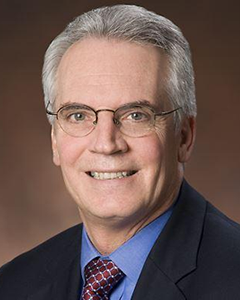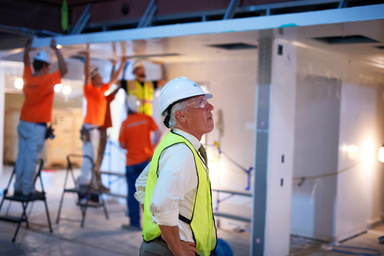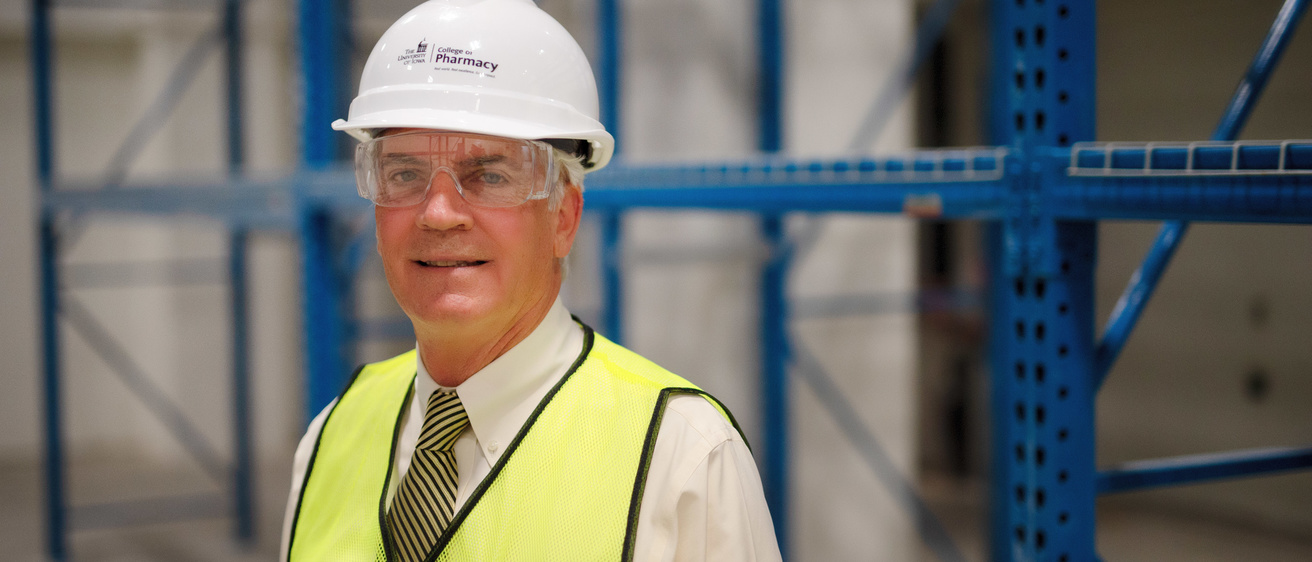Dennis M. Erb started as the new executive director of University of Iowa Pharmaceuticals in July 2019. His hiring has launched an era of rapid growth in capacity, revenue, and educational opportunities through innovative new business models.
Such planned growth, Erb believes, can dramatically improve healthcare for patients.
But first, who is Erb and what is University of Iowa Pharmaceuticals?
Dennis Erb—originally from New Jersey— earned a Bachelor of Science in pharmacy from the University of Connecticut in 1979 and a PhD in 1984 from the UI College of Pharmacy in pharmaceutics under major advisor Keith Guillory, now professor emeritus. Since he graduated, he has worked in various capacities during 32 years at Merck & Co, a large, multi-national pharmaceutical company.
University of Iowa Pharmaceuticals (UIP) is part of the UI College of Pharmacy. It is a unique service division that develops, manufactures, and performs analytical testing on medicinal drugs. Its clients include small biotech and large pharmaceutical companies, university researchers, and governmental laboratories. UIP produces both nonsterile products such as capsules and tablets, and sterile products such as injectables. The division’s employees have expertise in pharmaceutical manufacturing; the strict regulations they follow lead to high-quality drug products. Workers in its analytical laboratories and manufacturing areas work together to ensure they produce high-quality medicines.
There are two main factors behind the extreme expected growth of UIP. First, the sterile product production plant is expanding.
It will gain space in a modern new College of Pharmacy building which is on the cusp of opening. “The new facility will expand our capacity for sterile products five-fold from what we have right now,” said Erb. UIP will also continue making both nonsterile and sterile products in its current facility. For sterile products, UIP’s batch size capability will jump from 4,000 to 20,000 vials per batch. To keep up, hiring is exploding; it wasn’t long ago that there were 45 employees. Now there are 65, and numbers should top off around 98.

We have bigger plans for UIP to help advance healthcare that will not only benefit patients but also the college and university.
All that growth means UIP will be able to churn out much more product, quickly to meet the demand of its customers’ growth. Currently, after clients complete the first two phases of clinical testing on their potential new medicines, they need to enroll lots more people. In the past, the facility’s size could not always support such a jump in enrollment. However, the new space means UIP can keep its customers through all stages of clinical development—and potentially even be the supplier when their product hits the market.
At some point—specifically, Phase 3 studies—“companies usually take a look and say, ‘Can this place actually manufacture my marketed product?’” explained Erb. “Soon we will be able to say yes.”
“The increased capacity in manufacturing is part of what will help us grow UIP as a business,” Erb said.
The second factor for growth incorporates new business models. “We have bigger plans for UIP to help advance healthcare that will not only benefit patients but also the college and university.”
“So the question becomes, are there different businesses that we can create, other than what we’ve been doing, to satisfy unmet medical needs and in turn increase the reputation and UIP’s contribution to the college and university?”
The new managing director has spent his short time here so far making connections and asking questions.

The organization routinely supports researchers, startup, and commercial organizations. Many start a relationship with UIP right away when they want to apply for grant money to study what could end up, far down the road, as a new drug on the market available to patients. They might need help actually formulating the product to study. When a grant is awarded, clients often return to UIP to produce more of the drug product to be tested—also a service UIP provides.
Erb points to the “sites of excellence” on the UI campus: other colleges in the health sciences, as well as engineering, the University of Iowa Hospitals and Clinics, and the Center for Biocatalysis and Bioprocessing, to name a few.
He is putting feelers out to meet the leaders of such UI sites, to gauge their interest in joining forces to start a UI program or structure “that can show that the University of Iowa is the place to come if you want to develop a drug. It would be a resource where people could come for expert advice and applied research to progress their programs and, of course, have their products manufactured by UIP.”
Erb has been able to draw upon his experience and connections at Merck as he begins his new role. As new opportunities emerge, he always keeps what is best for patients in mind.
“We could have a great impact on people by addressing the serious and chronic problem of drug shortages,” Erb said.
With the right investments and a partnership with the FDA, Erb sees an opportunity for UIP to help reduce the drug shortage problem. “There are a number of older products that quite frankly don't bring in a lot of revenue for most larger companies so they don't invest in keeping those facilities up. This leads to shortages of medically necessary drugs for many patients.”
For now, UIP is busy keeping up with the demand. The organization currently has more than 90 active projects with more than 80 client organizations. Erb’s strategies will support its customers longer term and keep them coming back. Erb calls this “building a stable foundation.”
Finally, Erb’s “pet project” is to someday offer UIP’s clients a service based on his expertise in regulatory affairs.
Erb’s enthusiasm for his new post and its challenges is palpable.
“There are opportunities out there that can benefit patients,” he said. “If they're done appropriately, they can also help the college and university.
“It all comes down to benefiting patients and contributing to society. And isn’t that why we go into the pharmacy profession?”
